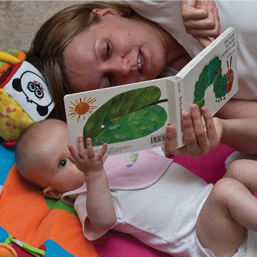-
Written by Janelle Wydeven, Director of Family Engagement, Calgary Reads; Photo: Fotolia.com
Maybe the COVID babies won’t get to coo at new friends on mats while the moms hold warrior pose at mom-and-me yoga, and maybe they won’t get to splash each other and get tossed high above the pool water in soggy diapers as the dads sing, “When you’re up, you’re up…” But what they do have is you. You and books.
As a new parent, you might not realize that it’s never too early to start reading aloud to your baby. Simply talking to your baby and playing together is an easy and important way to help build their brains - developing language skills that will help them become confident readers later on.
Every time you read to your baby, all kinds of activity is happening inside their busy minds to help them learn words, understand emotional cues, and feel secure and calm. Your baby needs your help to learn these skills. Just as you help your baby learn to fall asleep on their own and eat and crawl and, well, everything… you’re also there to help build your baby’s brain and emotional well-being through reading.
So, how do you read a book to your baby and make the most of these special moments?
- Choose books that your baby can hold and see. Books with bright and bold or high-contrast illustrations are easier for young babies to see and are more likely to captivate them. Board books or plastic bathtub books are easier for them to hold.
- Include rhyming and singing books. In addition to being a great source of fun and silliness, rhyming books offer diverse word choices and repetition to help your baby learn words. They’ll know the book before they can even read it!
- Snuggle as you read. Your baby enjoys you holding them close as much as they enjoy hearing your voice. Feeling safe and secure in your arms as you read builds your baby’s confidence and love of reading.
- ‘Serve and return’ their coos, growls, and gurgles. When your baby makes these sounds, they are communicating with you. These are their first attempts at speech and language. Encourage your baby’s attempts to mimic your sounds (speech) and language. Think of these moments as a tennis match: Baby coos, you coo back. You say hi, they imitate hi. The more baby practices these sounds, the clearer they will become, and they will love having your focused attention.
- Ask questions about the story and name that thing. As you read and sense the pictures and sounds they love in a story, name the objects that interest them (“That’s the moon! Isn’t it bright?”) to inspire their interest and curiosity and build their vocabulary. Comment on the story to encourage interaction and language development (“Mommy bunny reads a book before bed, we are reading a book, too!”).
- Re-read their favorite books. If there’s a book they adore, read it over and over. Repetition strengthens their language development and positive feelings about reading.
- Create a reading routine. Your baby can feel soothed in being able to predict what will happen next, and this becomes even more important as a young reader. Choose a time of day that works for your family (pre-bedtime and pre-naptime are popular reading happy hours) and make it a step they’ll look forward to every day.
- Keep books within baby’s reach. If you can, store some books on a shelf that’s within reach. If your baby can touch and play and love their books, they’ll want to read, and they’ll start to see themselves as a reader.
These are just a few fun and simple ways you can help your child become a happy, confident reader. Try a tip each time you read and see what works best for your child. Happy reading!
Janelle is the Director of Family Engagement at Calgary Reads, an organization changing the lives of children and families through the magic of reading. She regularly hosts baby book club workshops. Learn more and access free family reading resources at littleredreading.house.
